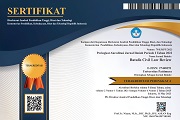Equivalence of Protection for Foreign and Domestic Creditors in Debt Restructuring Based on Positive Indonesian Law
 ), Suwari Akhamddhian(2), Sri Mulyani(3), Uche Nnawulezi(4)
), Suwari Akhamddhian(2), Sri Mulyani(3), Uche Nnawulezi(4)
(1) Faculty of Law, Universitas Kuningan, Kuningan, Indonesia
(2) Faculty of Law, Universitas Kuningan, Kuningan, Indonesia
(3) Faculty of Law, Universitas Kuningan, Kuningan, Indonesia
(4) College of Law, Bowen University, Iwo Osun State, Nigeria

 Corresponding Author
Corresponding Author
Abstract
Introduction: This article analyzes the legal implications of excluding foreign creditors in corporate debt restructuring in Indonesia. The study highlights the challenges faced by foreign creditors in securing their rights within the Indonesian legal framework, particularly in bankruptcy and Suspension of Debt Payment Obligation (PKPU) proceedings. The case of PT Visi Media Asia serves as a reference to illustrate these challenges and their legal consequences.
Purposes of the Research: The purpose of this study is to examine the legal impact of excluding foreign creditors in debt restructuring processes and to compare their legal position with domestic creditors under Indonesian law. By identifying regulatory gaps and inconsistencies, this study aims to provide recommendations for improving creditor protection and ensuring equal treatment in debt resolution mechanisms.
Methods of the Research: This research employs a normative legal methodology, utilizing a statutory, conceptual, and analytical approach. Legal materials are collected through document studies, including legislation, court rulings, and scholarly literature. The qualitative analysis is applied to interpret legal norms and evaluate their implementation in real cases, particularly focusing on the case of PT Visi Media Asia.
Results Main Findings of the Research: The findings reveal that Indonesia's current legal framework does not fully safeguard foreign creditors in debt restructuring, often favoring domestic creditors in judicial and regulatory practices. The study contributes to the discourse on legal reform by recommending clearer regulations and stricter enforcement to ensure fairness in debt restructuring, fostering investor confidence in Indonesia’s financial system.Keywords
DOI
10.47268/ballrev.v6i2.2918
Published
2025-07-31
How To Cite
@article{BALLREV2918,
author = {Dikha Anugrah and Suwari Akhamddhian and Sri Mulyani and Uche Nnawulezi},
title = {Equivalence of Protection for Foreign and Domestic Creditors in Debt Restructuring Based on Positive Indonesian Law},
journal = {Batulis Civil Law Review},
volume = {6},
number = {2},
year = {2025},
keywords = {Debt Restructuring; Foreign Creditors; Bankruptcy Law; Legal Protection.},
abstract = {Introduction: This article analyzes the legal implications of excluding foreign creditors in corporate debt restructuring in Indonesia. The study highlights the challenges faced by foreign creditors in securing their rights within the Indonesian legal framework, particularly in bankruptcy and Suspension of Debt Payment Obligation (PKPU) proceedings. The case of PT Visi Media Asia serves as a reference to illustrate these challenges and their legal consequences.Purposes of the Research: The purpose of this study is to examine the legal impact of excluding foreign creditors in debt restructuring processes and to compare their legal position with domestic creditors under Indonesian law. By identifying regulatory gaps and inconsistencies, this study aims to provide recommendations for improving creditor protection and ensuring equal treatment in debt resolution mechanisms.Methods of the Research: This research employs a normative legal methodology, utilizing a statutory, conceptual, and analytical approach. Legal materials are collected through document studies, including legislation, court rulings, and scholarly literature. The qualitative analysis is applied to interpret legal norms and evaluate their implementation in real cases, particularly focusing on the case of PT Visi Media Asia.Results Main Findings of the Research: The findings reveal that Indonesia's current legal framework does not fully safeguard foreign creditors in debt restructuring, often favoring domestic creditors in judicial and regulatory practices. The study contributes to the discourse on legal reform by recommending clearer regulations and stricter enforcement to ensure fairness in debt restructuring, fostering investor confidence in Indonesia’s financial system.},
issn = {2746-8151}, pages = {84--95} doi = {10.47268/ballrev.v6i2.2918},
url = {https://fhukum.unpatti.ac.id/jurnal/ballrev/article/view/2918}
}
Alfianti, Mutiara Bella, and Wiwin Yulianingsih. “Analisis Perbandingan Perlindungan Hukum Bagi Kreditur Dalam Kepailitan Lintas Batas Di Indonesia Dengan Korea Selatan” 3, no. 3 (2023).
Allivah, Andini Nurul. “Analisis Perlindungan Kreditor Asing Dalam Persoalan Kepailitan Berdasarkan Hukum Posistif Indonesia (Studi Kasus Terkait Putusan Pengadilan Niaga Jakarta Pusat 7/PDT.SUSPKPU/2016/PN.NIAGA.JKT.PST JO. Putusan Mahkamah Agung 482K/PDT.SUS-PAILIT/2016).” Undergraduated Thesis, Universitas Katolik Parahyangan, 2024.
Amboro, F Yudhi Priyo. “Pengaturan Hukum Kepailitan Indonesia: Kajian Perbandingan Hukum Amerika Serikat Dan Inggris.” Lex Prudentium Law Journal 1, no. 2 (2023). https://doi.org/10.61619/lexprudentium.v1i2.6.
Amboro, F. Yudhi Priyo. “Restrukturisasi Utang Terhadap Perusahaan Go Public Dalam Kepailitan Dan PKPU.” Masalah-Masalah Hukum 49, no. 1 (January 2020).
Aprita, Serlika. Hukum Kepailitan Dan Penundaan Kewajiban Pembayaran Utang. Makassar: Pena Indis, 2016.
Asra. Key Concept Kepailitan Korporasi. Jakarta: Kencana, 2024.
Efendi, Jonaedi, and Johnny Ibrahim. Metode Penelitian Hukum: Normatif Dan Empiris. Jakarta: Prenada Media Group, 2018.
Haspada, Deny. “Implementasi Perlindungan Hukum Terhadap Kreditor Dalam Kebangkrutan: Studi Komparatif Antara Indonesia Dan Negara-Negara Asean.” AKSELERASI: Jurnal Ilmiah Nasional 5, no. 1 (2023).
Hutajulu, Marihot Janpieter. “Kajian Yuridis Klausula Arbitrase Dalam Perkara Kepailitan.” Refleksi Hukum: Jurnal Ilmu Hukum 3, no. 2 (2019). https://doi.org/10.24246/jrh.2019.v3.i2.p175-192.
Ilmy, Besty Dyah Qorina, Iswi Hariyani, and Bhim Prakoso. “Kedudukan Kreditor Asing Dalam Perkara Penundaan Kewajiban Pembayaran Utang Terhadap Debitor Yang Berkedudukan Di Indonesia.” Mimbar Yustitia 7, no. 2 (December 2023): 163–80.
Levinthal, Louis Edward. The Early History Of Bankruptcy Law. Dublin: Creative Media Partners, 2022.
Mantili, Rai, and Putu Eka Trisna Dewi. “Penundaan Kewajiban Pembayaran Utang (PKPU) Terkait Penyelesaian Utang Piutang Dalam Kepailitan.” Jurnal Aktual Justice 6, no. 1 (2021). https://doi.org/10.47329/aktualjustice.v6i1.618.
Saija, Ronald. Perspektif Pailit Dalam Perusahaan. Yogyakarta: Deepublish, 2024.
Sjahdeini, Sutan Remy. Sejarah, Asas, Dan Teori Hukum Kepailitan Memahami Undang-Undang No. 37 Tahun 2004 Tentang Kepailitan Dan Penundaan Kewajiban Pembayaran. Jakarta: Kencana, 2016.
Usman, Rachmadi. Dasar-Dasar Hukum Beracara Di Pengadilan Niaga. 1st ed. Jakarta: Kencana, 2023.
Utami, Nabil Ratu, Tri Nadia, Samuel Paranna, Nyulistiowati Suryani, and Deviana Yuanitasari. “Strategi Restrukturisasi Utang Dalam Kasus Garuda Indonesia: Pendekatan PKPU.” DOKTRINA Journal of Law 7, no. 1 (2024). https://doi.org/10.31289/doktrina.v7i1.10939.
Yitawati, Krista, Pujiyono, and Adi Sulistiyono. Hukum Kepailitan Dan Penundaan Kewajiban Pembayaran Utang (PKPU). Yogyakarta: Deepublish, 2022.| Dublin Core | PKP Metadata Items | Metadata for this Document | |
| 1. | Title | Title of document | Equivalence of Protection for Foreign and Domestic Creditors in Debt Restructuring Based on Positive Indonesian Law |
| 2. | Creator | Author's name, affiliation, country | Dikha Anugrah; Faculty of Law, Universitas Kuningan, Kuningan; Indonesia |
| 2. | Creator | Author's name, affiliation, country | Suwari Akhamddhian; Faculty of Law, Universitas Kuningan, Kuningan; Indonesia |
| 2. | Creator | Author's name, affiliation, country | Sri Mulyani; Faculty of Law, Universitas Kuningan, Kuningan; Indonesia |
| 2. | Creator | Author's name, affiliation, country |
Uche Nnawulezi; College of Law, Bowen University, Iwo Osun State; Nigeria  |
| 3. | Subject | Discipline(s) | |
| 3. | Subject | Keyword(s) | Debt Restructuring; Foreign Creditors; Bankruptcy Law; Legal Protection. |
| 4. | Description | Abstract | Introduction: This article analyzes the legal implications of excluding foreign creditors in corporate debt restructuring in Indonesia. The study highlights the challenges faced by foreign creditors in securing their rights within the Indonesian legal framework, particularly in bankruptcy and Suspension of Debt Payment Obligation (PKPU) proceedings. The case of PT Visi Media Asia serves as a reference to illustrate these challenges and their legal consequences.Purposes of the Research: The purpose of this study is to examine the legal impact of excluding foreign creditors in debt restructuring processes and to compare their legal position with domestic creditors under Indonesian law. By identifying regulatory gaps and inconsistencies, this study aims to provide recommendations for improving creditor protection and ensuring equal treatment in debt resolution mechanisms.Methods of the Research: This research employs a normative legal methodology, utilizing a statutory, conceptual, and analytical approach. Legal materials are collected through document studies, including legislation, court rulings, and scholarly literature. The qualitative analysis is applied to interpret legal norms and evaluate their implementation in real cases, particularly focusing on the case of PT Visi Media Asia.Results Main Findings of the Research: The findings reveal that Indonesia's current legal framework does not fully safeguard foreign creditors in debt restructuring, often favoring domestic creditors in judicial and regulatory practices. The study contributes to the discourse on legal reform by recommending clearer regulations and stricter enforcement to ensure fairness in debt restructuring, fostering investor confidence in Indonesia’s financial system. |
| 5. | Publisher | Organizing agency, location | Faculty of Law, Universitas Pattimura |
| 6. | Contributor | Sponsor(s) | |
| 7. | Date | (YYYY-MM-DD) | 2025-07-31 |
| 8. | Type | Status & genre | Peer-reviewed Article |
| 8. | Type | Type | |
| 9. | Format | File format | |
| 10. | Identifier | Uniform Resource Identifier | https://fhukum.unpatti.ac.id/jurnal/ballrev/article/view/2918 |
| 10. | Identifier | Digital Object Identifier | 10.47268/ballrev.v6i2.2918 |
| 11. | Source | Title; vol., no. (year) | Batulis Civil Law Review; Vol 6, No 2 (2025): VOLUME 6 ISSUE 2, JULY 2025 |
| 12. | Language | English=en | en |
| 13. | Relation | Supp. Files |
Untitled (185KB) |
| 14. | Coverage | Geo-spatial location, chronological period, research sample (gender, age, etc.) | |
| 15. | Rights | Copyright and permissions | Copyright: Authors who publish their manuscripts in this Journal agree to the following conditions: 1. The copyright in each article belongs to the author, as well as the right to patent. 2. Authors are able to enter into separate, additional contractual arrangements for the non-exclusive distribution of the journal's published version of the work (e.g., post it to an institutional repository or publish it in a book), with an acknowledgment of its initial publication in this journal. 3. Authors are permitted and encouraged to post their work online (e.g., in institutional repositories or on their website) prior to and during the submission process, as it can lead to productive exchanges, as well as earlier and greater citation of published work. 4. Authors have the right to self-archiving of the article (Author Self-Archiving Policy)
Licence : Batulis Civil Law Review Journal is disseminated based on the Creative Commons Attribution-NonCommercial 4.0 International license terms. This license allows anyone to copy and redistribute this material in any form or format, compose, modify, and make derivatives of this material for any purpose. You cannot use this material for commercial purposes. You must specify an appropriate name, include a link to the license, and certify that any changes have been made. You can do this in a way that is appropriate, but does not imply that the licensor supports you or your use.
|
Copyright (c) 2025 Dikha Anugrah, Suwari Akhamddhian, Sri Mulyani, Uche Nnawulezi

This work is licensed under a Creative Commons Attribution-NonCommercial 4.0 International License.

 : 952 times
: 952 times Download : 543 times
Download : 543 times














